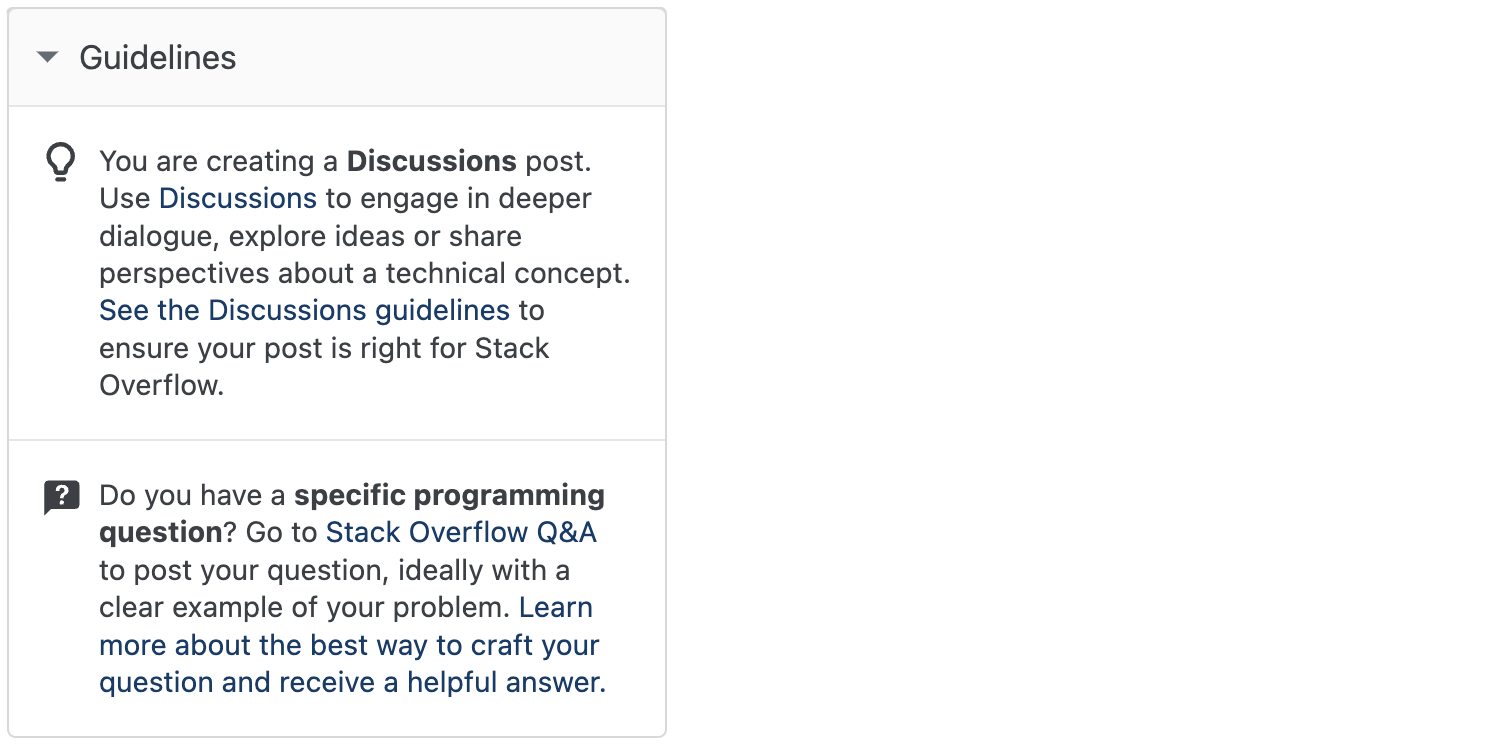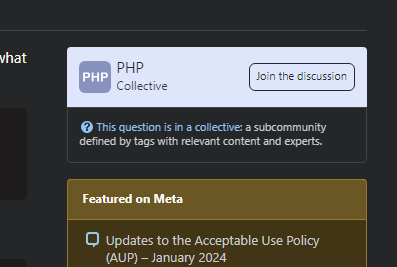UPDATE: February 7, 2024
As detailed in the original version of this post, Discussions can now be created on a wider range of topics, using any existing Stack Overflow tag.
To get started with Discussions, click “Discussions” on the left navigation under “Labs.” You can also access Discussions directly here.
Several Help Center articles have been updated or created, to reflect the broader scope of Discussions:
- What is the Discussions feature, and how does it work?
- Discussions Guidelines
- Who are the Discussions moderators and what do they do?
Two notable changes accompany this update. The “Labs” item on the left navigation is now above the “Collectives” item. Additionally, users subject to a question ban will not be able to create a new post in Discussions.
We continue to welcome feedback on this post as the Discussions experiment moves into this expanded iteration.
The Discussions experiment within several collectives has shown potential, with the number of users continuing to engage with Discussions looking promising. There are signs that users are finding value in Discussions and have interest in contributing in this space that has a lower entry barrier than Q&A. For the next phase of the experiment, we will expand the scale of Discussions on Stack Overflow.
In February, Discussions will expand beyond Collectives and be available for all tags on Stack Overflow. It will be possible to create a discussion for any technical topic, allowing us to determine the viability of Discussions as a way to meet user needs. The research behind the development of Discussions was previously outlined in this post.
Details
The primary entry point to view and contribute will be the Discussions list page linked on the left navigation under “Labs.” Collectives that have Discussions enabled will still have a tag-filtered list available within the collective’s navigation, maintaining the view of Discussions that members of those collectives have been using up to this point.
A few other technical notes:
Users will not be able to create new tags as part of starting a discussion post.
In the rare case that a Discussion post loses all of its tags via automated tag cleanup processes, it will be tagged as “untagged”.
The automations involved in tag usage assessment remain Q&A-focused and don’t look at Discussions usage as a factor.
The user card displayed for Discussions replies will be the "small" style, showing gold and silver badge counts (this is already used for the initial post that starts a discussion).
The separation from Collectives means that the Recognized Member badge will not display for those users in Discussions after these changes are rolled out.
Membership in a collective is no longer required to post or reply in Discussions.
Preparing for scale
User guidance and anti-spam prevention measures
Over the past few months, we’ve worked to establish functionality and automations to manage spam in Discussions. Unfortunately before these were released, Discussions was hit with a disruptive spam wave. We have now rolled out several features to prevent it from happening again.
Spam prevention features include:
Rate limiting controlling how often users can make Discussions posts and replies
Automated post deletion via flagging (similar to what exists in Q&A). Four flags of either the “spam” or “rude/abusive” types (or one from a moderator) will trigger deletion of a post.
Preventing users who are banned from asking questions from making Discussions posts (this one is still in progress)
In the Discussions experiment, a common issue we've seen is users unclear about the distinctions between a discussion and a question, often creating a discussion that should actually be a question. To begin to address this pattern, we have updated the guidance on the Discussions post creation screen (pictured below) to summarize what a Discussion post should be, and guide users toward asking a question instead, if needed. In a fully realized implementation of Discussions, we can start to imagine scenarios such as:
Migrating questions to Discussions, as part of the closure process, when the post is better suited for dialogue and open-ended conversation
Routing programming-specific Discussions posts (that really should be questions) over to Staging Ground to help those new contributors refine their post up to Q&A standards
Please note that those scenarios are only ideas at this time, based on what we’re learning. Helping newer users find success (including determining the right place to post) is a focus of continuing development for all parts of the public platform.
 The right sidebar text from the Discussions post creation screen, which includes links to (from top to bottom) the main Discussions Help Center page, the Discussions guidelines, the Questions page, and the Help Center page focused on asking questions.
The right sidebar text from the Discussions post creation screen, which includes links to (from top to bottom) the main Discussions Help Center page, the Discussions guidelines, the Questions page, and the Help Center page focused on asking questions.
Discussions moderators
Through March, we’ll also be working to further define what is, for now, an informal role on Stack Overflow – the “Discussions moderator.” With the moderation toolset separate from what’s in place for Q&A, we’re able to extend moderation of Discussions to community members who have volunteered to help “pilot” this role. In addition to assessing and handling flags, these moderators can edit, delete, and undelete Discussions posts. They cannot suspend users or redact content.
Right now, this group consists of Stack Exchange site moderators, Recognized Members from community-managed collectives, and users who’ve been highly engaged with Discussions by offering feedback and putting effort toward curating the content. Future conversations within the community can focus on how users become part of this group and what might be expected from them.
Discussions moderators are: Abdulla Nilam, Dalija Prasnikar, Laurel, M--, Thomas Markov, Wicket (updated Feb 7 2024). This Help Center article will serve as the official roster for this group and will be updated as needed. As an informal group that is part of the Discussions experiment, Discussions moderators are not yet denoted by badges or other visual role designations. All Stack Overflow site moderators also have access to all Discussions moderation functions, and are welcome to moderate as they see fit, but are not obligated to do so.
Promising signs
Quantitative and qualitative feedback from the first portion of the Discussions experiment suggests that there is an appetite for both participating in and consuming this type of content.
We are seeing roughly 35% higher weekly retention rate among contributors of Discussions vs Q&A — meaning users that contribute in Discussions are more likely to return and contribute again. There are several factors and caveats to consider as we monitor and compare retention rates:
Q&A is a mature feature with a long-standing user base
Q&A content is several orders of magnitude larger than Discussions so we have more data to work with and understand
Standards for engaging with Q&A are higher and therefore the natural frequency of usage may be lower (monthly vs weekly or daily)
Comparing retention rates at this stage is only a proxy to understand the potential impact Discussions will have for users on the platform.
On a more qualitative note, it's a good sign that even the lower-quality and "should be a question" posts get genuine engagement, even though many of these will end up being removed if they do not meet the Discussions guidelines. Community members are replying and making a good faith effort to help by offering their perspectives or participating in the conversation. Often the authors of the posts are also interacting in replies. This shows that there is an appetite for this type of lower stakes contribution within the community. Some of those people will stick around because of the experience they’re having in Discussions. And some of those people will feel more confident about participating in Q&A in the future. Some longtime Stack Overflow users will become more active again as they explore new ways to connect, share their knowledge, and learn. This is a potential path for the community to thrive in a new way and to replenish itself.
By the end of March, we expect to have determined more about the future of Discussions based on usage, retention, content quality, and community feedback.
We will update this post once Discussions as been expanded to all tags.
Are you interested in contributing to Discussions now that more topics are included?
How can new users be guided toward creating a successful Discussions post? How can we encourage the creation of high quality Discussions?
